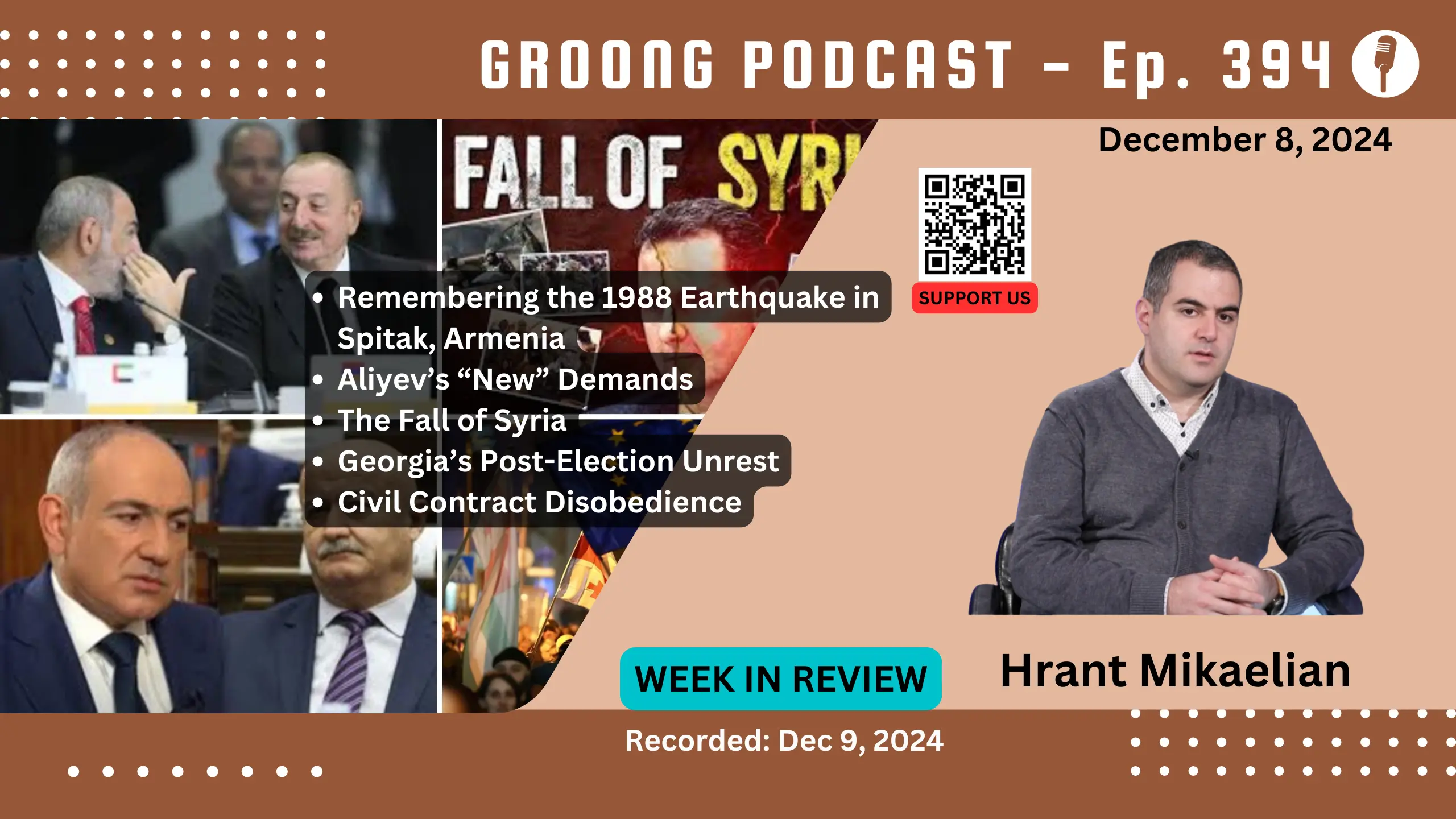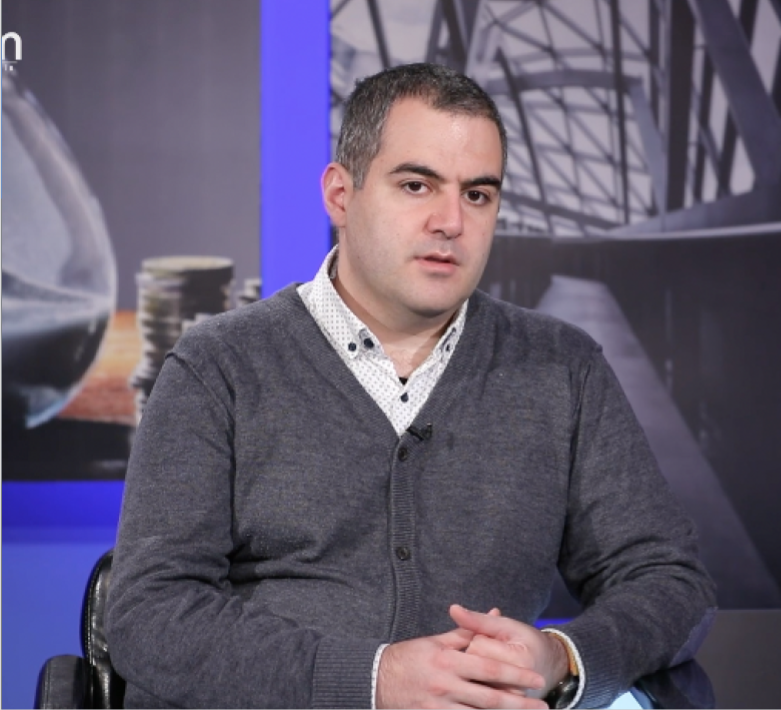
Groong Links:
Guest:
Topics:
- Remembering the 1988 Earthquake in Spitak, Armenia
- Aliyev’s “New” Demands
- The Fall of Syria
- Georgia’s Post-Election Unrest
- Civil Contract Disobedience
Episode 394 | Recorded: December 9, 2024
Show Notes
Remembering the 1988 Earthquake in Spitak, Armenia
“Ils sont tombés, sans trop savoir pourquoi” — Charles Aznavour’s poignant lyrics remind us of the tragedy that united Armenians after the devastating Spitak earthquake on December 7, 1988. Last week marked 36 years since the catastrophe that claimed tens of thousands of lives and rallied Armenians worldwide, with Aznavour leading global relief efforts through concerts and the Aznavour Foundation.
Yet the scars of Spitak endure, as the government failed to fully utilize diaspora support, leaving the earthquake zone still not fully rebuilt. Remembering this tragedy should inspire unity today, urging Armenia’s leaders to rally Armenians globally to rebuild and strengthen the nation.
Let’s use this week to reflect on how each of us has a role in rebuilding Armenia.
Aliyev’s “New” Demands
The latest in the saga of the so-called “negotiations”…
Aliyev explicitly said that Armenia must negotiate with the “Western Azerbaijan” community in order to ensure the “dignified return to their ancestral lands.” Even though Aliyev voiced these demands himself for the first time, it is clear that the Azerbaijani government was preparing for this move a long time ago.
On the Armenian side, the issue has largely been kept outside of the public attention, although there are various media reports that Philip Reeker has been or had been (in his role as a co-chair) involved in discussions with the Armenian NGO sector on the so-called “return” of Azerbaijanis to Armenia.
Let’s also not forget that recently Pashinyan, in an interview, brought up the topic of “Western Azerbaijan” completely out of the blue, which roused the suspicion of many observers. He drew a parallel between the genuine state-sponsored expansionist efforts by Azerbaijan who spread maps of “Western Azerbaijan” which - for our listeners - is Armenia’s sovereign territory and Armenian historical references to “Western Armenia”.
Questions:
- Is it possible that this issue has been agreed upon or negotiated by Pashinyan with Aliyev and has been deliberately kept away from the minds of the Armenian public?
- Why is a US official in Armenia discussing this issue with NON-elected groups?
- What is the role of these “Civil Society” groups in these talks?
- What is the role of the US playing in this?
- With Pashinyan’s “Western Azerbaijan” statement in his interview, is this an indication that the Armenian government is slowly trying to bring this issue to the forefront?
- Is it possible that this point is one of the yet-to-be-agreed point
- Can Aliyev use this threat as a pretext for his next invasion of Armenia, in order to “resettle” Azerbaijanis in Armenia?
During a meeting of the OSCE FMs in Malta, Secretary of State Blinken proposed to Armenia and Azerbaijan to continue peace talk with US mediation, but Azerbaijan categorically rejected this offer, because Azerbaijan now regards the US, or at least this administration, to be biased and pro-Armenian.
Questions:
- Is Azerbaijan rejecting US efforts, or is it biding its time until the Trump administration moves in?
The Fall of Syria
Last week we discussed the terrorist operation against the Syrian government in the north of Syria. It caught Bashar al-Assad’s government by surprise, and it looked like it also caught Iranian and Russian intel by surprise as well. Everyone expected that the Syrian army would rebound, kick in and fight back.
This week the whole operation ended after Aleppo, Hama, Homs and Damascus fell in the past few days, and Assad and his family took refuge in Moscow. Additionally, it looks like the operation may not have been a surprise for Russia (at least), but possibly an agreed upon “special operation”.
Questions:
- What happened in Syria? Why did it fold so quickly?
- Why didn’t the Russians or Iranians intervene?
- Is it possible that Russia “conceded” Syria, because it’s too busy in Ukraine?
This overall operation seems to have been planned and tactically guided by Turkey, and assisted by US and Israeli intelligence and guidance. In a sense I can not but see the parallels between this and the 44-day war.
After the fall of Damascus, Israel is now essentially directly on the Iraqi border, which is basically a very porous line in the sand. So it’s much closer to Iran. And of course Israel is also on Azerbaijan’s southern border with Iran.
Questions:
- What does the situation in Syria mean for Iran, and for Armenian what does it portend about Iran’s ability to deter Azerbaijan in case it invades Armenia?
Georgia’s Post-Election Unrest
Post-election unrest continues in Tbilisi. President Salome Zourabichvili continues to lead pro-Western civil society types to demand the annulment of the election results which gave Georgian Dream a parliamentary majority. They have set a presidential election date which is next weekend, December 14.
Questions:
- How would you compare the protests in the Georgian elections with protests in Armenia?
- In Armenia, during various protests, authorities used force and stun grenades.
- In Georgia, the protests were violent, using fireworks against police and shining lasers in the eyes of the police. And these protests were called “peaceful” by foreign embassies, who condemned “brutality” by the police.
- During the “Resistance Movement” protest, there were days when authorities arrested more than 500 people in one day. Yet, silence from foreign embassies.
- Will the Georgian government be able to survive this obviously foreign influenced mass protests?
Civil Contract Disobedience
In November Pashinyan text-fired a number of his friends and colleagues from their government positions. Some were glaringly inappropriate, for example Karen Andresyan, as the head of the Supreme Judicial Court (SJC), should at least theoretically have been independent of the executive branch and immune from demands to resign. But Andreasyan’s subservient resignation proved that there are no checks and balances in the various branches of the Armenian government: executive, legislative, or judicial. On the legislative side, MP Hovik Aghazaryan was the one recipient of the texts who refused to comply.
Aghazaryan is no angel, and Pashinyan seems to have plenty of Kompromat on him, and reportedly he has been summoned to the Anti-Corruption Committee (ACC), his mobile devices were confiscated for investigation, and surprise, the data was shared with Pashinyan, and he then shared it with the ruling party leadership. Aghazaryan is now allegedly being blackmailed for his refusal to resign.
Questions:
- Are we seeing cracks appear in the ranks of the Civil Contract ruling party?
Thoughts from the Participants
- Hrant: The Syrian situation is very important for Armenia. Pay attention to it!
- Hovik: When Assad was in Armenia in 2009, Serge Sargsyan warned him “My friend, you don’t know the Turks well. But time will tell.” Sargsyan’s quote is taken from Միայնակ ընդդեմ ճակատագրի, by Սամվել Ֆարմանյան.
Wrap-up
That’s our Week in Review, we hope you found it helpful. We invite your feedback and your suggestions, you can find us on most social media and podcast platforms.
Thanks to Laura Osborn for the music on our podcasts.
Guests

Hrant Mikaelian
Hrant Mikaelian, a political scientist and multidisciplinary researcher in social sciences based in Yerevan. He is also a senior researcher at the Caucasus Institute. Hrant is a co-founder of the Armenian Project.
Hosts

Hovik Manucharyan
Hovik Manucharyan is an information security engineer who moved from Seattle to Armenia in 2022. He co-founded the ANN/Groong podcast in 2020 and has been a contributor to Groong News since the late 1990s.
Disclaimer: The views expressed by Hovik Manucharyan on the ANN/Groong podcast are his own and do not necessarily reflect the opinions of his employer or any other organization.

Asbed Bedrossian
Asbed Bedrossian is an IT professional, and for years oversaw the central IT enterprise infrastructure and services at USC. His decades of experience spanned across IT strategy, enterprise architecture, infrastructure, cybersecurity, enterprise applications, data center operations, high performance computing, ITSM, ITPM, and more.
Asbed founded the Armenian News Network Groong circa 1989/1990, and co-founded the ANN/Groong podcast in 2020.